Because in France there is a battle over pensions

Pension reform is Emmanuel Macron's main battle. Here's what he expects and why it has sparked strong tensions. Alberto Toscano's article for International Affairs
Pension reform is now "the mother of all battles" for the President of France Emmanuel Macron , who is committing his second term in a gamble that is as inevitable as it is urgent for him. In the memory of the French there is the pension reform voted by Parliament at the end of his first term at the Elysée and never entered into force due to both Covid and social tensions. Now a new text is being discussed, presented as more digestible by public opinion, which nonetheless remains largely hostile.
DIALOGUE WITH THE SOCIAL PARTIES
Prime Minister Elisabeth Borne has attempted dialogue with the social partners in recent months. It will not help to avoid confrontation, given that the unions are firmly opposed to the reform and a national day of protest is already scheduled for January 19th.
The attempt serves Borne to demonstrate good faith and good intentions. The battle will be long and the two "generals" of the Macronist army (Borne and his Labor Minister Olivier Dussopt) are former socialists animated by the hope of splitting the union front. They seek an understanding above all with the CFDT, the confederation considered more pragmatic.
The problem is that the CFDT has blown away some possibilities for negotiation by seeking a compromise on the old text of the last legislature. Today he is intransigent because he is distrustful. It therefore marches (at least for the moment) together with the other two main trade union confederations, CGT and Force ouvrière.
WHAT THE PENSION REFORM IN FRANCE PROVIDES
The key points of the reform are:
- increase from the current 62 to 64 of the "legal retirement age";
- progressive nature of this increase (so that it will reach 64 years in 2030);
- progressive increase in the number of years needed to obtain a full pension (up to 43 years of contributions in 2027, instead of in 2035 as envisaged by the law in force today);
- end – for future recruits – of the exception constituted by régimes spéciaux (such as those present in the transport sector, with early pensions compared to other categories);
- exceptions for those who perform strenuous duties;
- measures in favor of career reconstruction (also taking into account "jobs of collective utility");
- increase in the minimum pension, which will be 1,200 euros gross per month for those with maximum contributions.
THE PROTEST OF THE OPPOSITIONS
In illustrating the reform as a whole, Elisabeth Borne and Olivier Dussopt insisted on the philosophy of President Macron and the government: to save the current system of social guarantees, threatened in their opinion by the deficit of the national pension system, which would risk – in the absence of the measures under discussion – to worsen in the next few years to the point of exceeding (in the optimistic hypothesis of very low unemployment) the level of 12 billion in 2030 and then sinking further into a vortex of 'red'.
In the National Assembly, the Macronist coalition has only a relative majority (250 out of 577 deputies). It therefore lacks a nice hoard of votes to pass the bill peacefully. The main opposition groups are the extreme right of Marine Le Pen's Rassemblement national (88 deputies) and the extreme left of Jean-Luc Mélenchon's France insoumise (74), determined to fight to the last polemical firecracker ( a Mélenchonist leader has said that the deputies of her group will present "a thousand amendments each").
The way out for the government lies in the support of the neo-Gaullist right of the Républicains (62 deputies), which was announced in recent days but on which some doubts continue to weigh (also because several neo-Gaullists should not vote in favour). The new leader of the party, Eric Ciotti has credited himself with pushing the government to improve the bill (with the retirement age at 64 instead of 65), but it is hard to imagine that a smile from Madame Borne enough to dress like a good Samaritan.
If the parliamentary battle gets bogged down, Macron and Borne will only be able to play the card of trust, which would pass the law at the price of exacerbating the streets. The French-style trust is 'harder' than the Italian one: a bill is approved without even being put to the vote (the opposition can only present a no-confidence motion, which however must obtain the majority of the votes: which implies the convergence of very different political families). The game is open. Surprises are not impossible. Much will depend on whether the pension protest ends (or not) by also expressing the current discontent on the cost of living front.
This is a machine translation from Italian language of a post published on Start Magazine at the URL https://www.startmag.it/mondo/francia-pensioni-cosa-succede/ on Sat, 14 Jan 2023 06:58:36 +0000.
